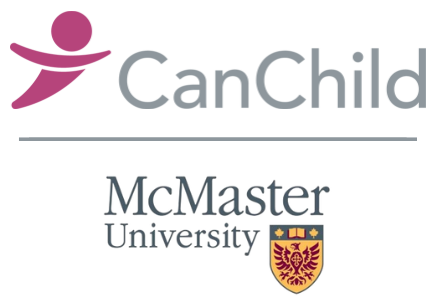F-words Videos
F-words for Child Development: From the voice of a Parent
This 4-minute video introduce the F-words for Child Development through the eyes of a family. It shows how this approach focuses on strengths and the things a child, youth and family can do! There are links to tools that can help you tell your F-words story and includes information on further learning opportunities.
Share this Page
This 7-minute video outlines the International Classification for Functioning, Disability and Health, the F-words for Child Development, and describes how ICF and F-words facilitate strength-based, family centred, holistic, relational, and lifespan approaches to collaborative child and family services. It can be used to introduce these ideas in clinical, teaching, and community settings. There are links to further information, tools, and additional learning opportunities.
My Favourite Words
Produced in collaboration with Instituto Nossa Casa (Brasil) with support from the Ontario Brain Institute.
The video is translated in Spanish, Brazilian Portuguese, Icelandic and Hebrew. Click on CC button to select a translation.
These six F-Words won’t fill up your swear jar: What do the F-Words mean to youth with impairments?
Created in partnership with Ontario youth with disabilities with funding from the Ontario Brain Institute.
So many of the resources on CanCHild's F-words hub have been created and shared by generous parents and colleagues around the world. We are privileged to share these resources with people - with the active agreement of the people who created them, and with acknowledgement and attribution. As autumn 2022 has rolled in, we are delighted to post an exciting and inspiring video from the Jastrzębski family from Poland.
Here is the note we received from Dr. Jastrzębski:
'Our film was created as a work of our whole family. My wife Edyta Jastrzębski, our heroine of the movie Teresa, our son Antoni and me Artur Jastrzębski. We live in Poland in Wrocław. My wife is a special educator, while I am a psychologist and art teacher. You can contact us using the e-mail address: jastrzebski.artur@yahoo.com
CanChild is very grateful to people who help spread the ideas we all value. Thank you!
F-words in Childhood Disability Awareness Video
A three-minute awareness video co-created by families and researchers to spread awareness on the F-words in Childhood Disability.
(Time: 3 minutes)
An introduction to the six F-words in Childhood Disability
Dr. Rosenbaum introduces the six F-words in Childhood Disability - Function, Family, Fitness, Fun, Friends, Future.
(Time: 2 minutes)
Scootering for Children and Youth is More Than Fun
This is the video abstract of the paper, "Scootering for Children and Youth Is More Than Fun: Exploration of a Feasible Approach to Improve Function and Fitness".
Scootering is fun, and it can also benefit the health and well-being of children with and without disabilities. The paper examines scootering within the International Classification of Functioning, Disability and Health (ICF) and the F-Words for Child Development frameworks. Diverse methods ranging from biomechanical motion analysis to qualitative child/family reports explore many aspects of the activity of scootering.
Wright, Marilyn PT, MSc; Twose, Donna BScKin; Gorter, Jan Willem MD, PhD Scootering for Children and Youth Is More Than Fun, Pediatric Physical Therapy: August 24, 2021 - Volume - Issue - doi: 10.1097/PEP.0000000000000829
Coordinated Service Planning & F-Words
Helen is a 12-year-old kid who loves swimming, therapeutic horseback riding, and spending time with her family. She enjoys playing outdoors and going to camp has always been one of her biggest goals. Helen’s mom, Andrea, shared how the F-words for Child Development can be used in the Coordinated Service Planning (CSP) process to set visions and goals that are meaningful to Helen and their family. The main objective of CSP is to provide a seamless and family-centred service experience. CSP connects families and professionals to co-create a Single Plan Of Care (SPOC) that will support children and youth with special needs to participate fully and achieve their goals. Service Planning Coordinators across Ontario are using the F-Words for Child Development (Function, Friends, Family, Fun, Fitness and Future) throughout the CSP process.
This video is created as part of KidsInclusive/EnfantsInclus Family Impact Film on Coordinated Service Planning – Better Together. Special thanks to Helen, Andrea, and their family for making this project possible.
Original KidsInclusive/EnfantsInclus Family Impact Film on Coordinated Service Planning – Better Together can be found here.
Coordinated Service Planning & F-Words from CanChild on Vimeo.
CSP and F-words Video created by Geil Astorga, CanChild Centre for Childhood Disability Research
Music: Memories from bensound.com
Mahinawa Specialist School, NZ - Our Favourite F-Words
Mahinawa Specialist School and Resource Centre is a New Zealand state, specialist, co-educational school for students aged between five and twenty one years who have intellectual, physical, emotional and/or behavioural needs. Our students require and receive an integrated programme of education and therapy from a multi-disciplinary team including Speech and Language Therapy, Occupational Therapy, Music Therapy, Physiotherapy, and Behaviour Therapy.
In 2020 we are exploring what the F-words framework might bring to our NZ school and cultural setting: Whanaungatanga (relationships: seeking to know what whanau/family think and want); Ako (to learn: knowing our students as individuals, using student interests to make learning relevant), Wānanga (listening to pupils and whanau about their learning).
Vicki Cavalieros, CEO, Cerebral Palsy Support Network (CPSN), Australia
Vicki Cavalieros discusses the F Words and how clinicians should work with individuals with cerebral palsy and their families.
Tess Karambelas, Cerebral Palsy Support Network (CPSN), Australia
Tess Karambelas gives personal insight and advice for clinicians working with individuals with cerebral palsy.
